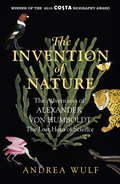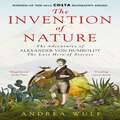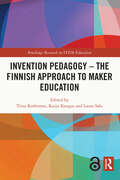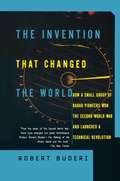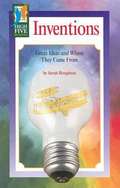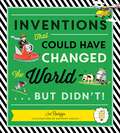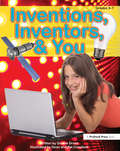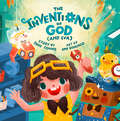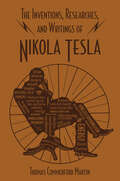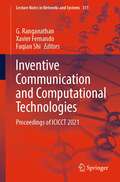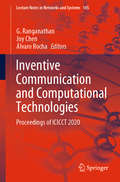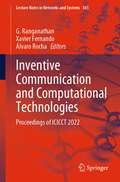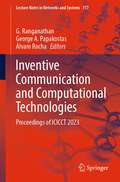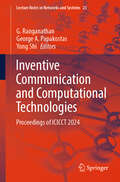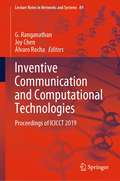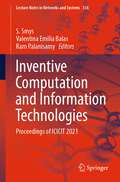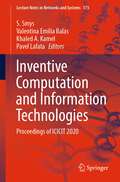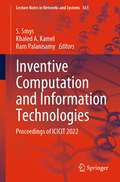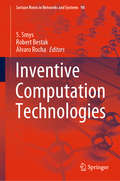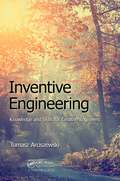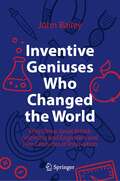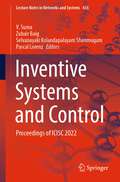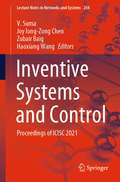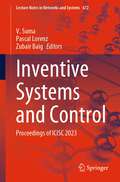- Table View
- List View
The Invention of Nature: The Adventures of Alexander von Humboldt, the Lost Hero of Science: Costa & Royal Society Prize Winner
by Andrea WulfWINNER OF THE 2015 COSTA BIOGRAPHY AWARDWINNER OF THE ROYAL SOCIETY SCIENCE BOOK PRIZE 2016'A thrilling adventure story' Bill Bryson'Dazzling' Literary Review 'Brilliant' Sunday Express'Extraordinary and gripping' New Scientist'A superb biography' The Economist'An exhilarating armchair voyage' GILES MILTON, Mail on Sunday Alexander von Humboldt (1769-1859) is the great lost scientist - more things are named after him than anyone else. There are towns, rivers, mountain ranges, the ocean current that runs along the South American coast, there's a penguin, a giant squid - even the Mare Humboldtianum on the moon. His colourful adventures read like something out of a Boy's Own story: Humboldt explored deep into the rainforest, climbed the world's highest volcanoes and inspired princes and presidents, scientists and poets alike. Napoleon was jealous of him; Simon Bolívar's revolution was fuelled by his ideas; Darwin set sail on the Beagle because of Humboldt; and Jules Verne's Captain Nemo owned all his many books. He simply was, as one contemporary put it, 'the greatest man since the Deluge'.Taking us on a fantastic voyage in his footsteps - racing across anthrax-infected Russia or mapping tropical rivers alive with crocodiles - Andrea Wulf shows why his life and ideas remain so important today. Humboldt predicted human-induced climate change as early as 1800, and The Invention of Nature traces his ideas as they go on to revolutionize and shape science, conservation, nature writing, politics, art and the theory of evolution. He wanted to know and understand everything and his way of thinking was so far ahead of his time that it's only coming into its own now. Alexander von Humboldt really did invent the way we see nature.
The Invention of Nature: The Adventures of Alexander von Humboldt, the Lost Hero of Science: Costa & Royal Society Prize Winner
by Andrea WulfWINNER OF THE 2015 COSTA BIOGRAPHY AWARDWINNER OF THE ROYAL SOCIETY PRIZE 2016'Dazzling' Literary Review 'Brilliant' Sunday Express'Extraordinary and gripping' New Scientist'A superb biography' The Economist'An exhilarating armchair voyage' GILES MILTON, Mail on Sunday Alexander von Humboldt (1769-1859) is the great lost scientist - more things are named after him than anyone else. There are towns, rivers, mountain ranges, the ocean current that runs along the South American coast, there's a penguin, a giant squid - even the Mare Humboldtianum on the moon. His colourful adventures read like something out of a Boy's Own story: Humboldt explored deep into the rainforest, climbed the world's highest volcanoes and inspired princes and presidents, scientists and poets alike. Napoleon was jealous of him; Simon Bolívar's revolution was fuelled by his ideas; Darwin set sail on the Beagle because of Humboldt; and Jules Verne's Captain Nemo owned all his many books. He simply was, as one contemporary put it, 'the greatest man since the Deluge'.Taking us on a fantastic voyage in his footsteps - racing across anthrax-infected Russia or mapping tropical rivers alive with crocodiles - Andrea Wulf shows why his life and ideas remain so important today. Humboldt predicted human-induced climate change as early as 1800, and The Invention of Nature traces his ideas as they go on to revolutionize and shape science, conservation, nature writing, politics, art and the theory of evolution. He wanted to know and understand everything and his way of thinking was so far ahead of his time that it's only coming into its own now. Alexander von Humboldt really did invent the way we see nature.Recorded by arrangement with Doubleday, an imprint of the Knopf Doubleday Publishing Group, a division of Penguin Random House LLC; (P)2015 Highbridge, a division of Recorded Books
Invention Pedagogy – The Finnish Approach to Maker Education (Routledge Research in STEM Education)
by Tiina Korhonen Kaiju Kangas Laura SaloThis collection, edited and written by the leading scholars and experts of innovation and maker education in Finland, introduces invention pedagogy, a research-based Finnish approach for teaching and learning through multidisciplinary, creative design and making processes in formal school settings. The book outlines the background of, and need for, invention pedagogy, providing various perspectives for designing and orchestrating the invention process while discusses what can be learnt and how learning happens through inventing. In addition, the book introduces the transformative, school-level innovator agency needed for developing whole schools as innovative communities. Featuring informative case study examples, the volume explores the theoretical, pedagogical, and methodological implications for the research and practice of invention pedagogy in order to further the field and bring new perspectives, providing a new vision for schools for decades to come. Intermixing the results of cutting-edge research and best practice within STEAM-education and invention pedagogy, this book will be essential reading for researchers, students, and scholars of design and technology education, STEM education, teacher education, and learning sciences more broadly.
The Invention That Changed the World: How a Small Group of Radar Pioneers Won the Second World War and Launched a Technological Revolution (Sloan Technology Series)
by Robert Buderi"The Invention That Changed the World by Robert Buderi is a dazzling study, combining hard science with the daily drama of warring nations struggling to avoid disaster.... He has woven together a remarkable tale of science, politics, and warfare." - Guy Halversoim, The Christian Science Monitor "Masterly. . . Buderi cannot be praised too highly for producing a scholarly and superbly researched book which is also enjoyable to read." - Ian Morison, New Scientist "Buderi's Book can awaken the interest of even the most jaded and nontechnical reader. Radar did change the world, and Buderi nicely describes how."- Norman N. Brown, The Associated Press "Much of our view of the technological achievements emerging from World War II is driven by nuclear fetishism, but a more fundamental truth is revealed in the subtitle to this remarkable book. . . . Through extensive interviews and impressive bibliographies, the author has produced a fascinating history." - Library Journal
The Invention with a Thousand Uses (Fountas & Pinnell LLI Red #Level J)
by Christine KielAn Invention Named for a Duck? It was used in war. It's sticky. And it was named for a duck. What is it?
Inventions: Great Ideas and Where They Came From
by Sarah HoughtonHighlights inventions and inventors throughout history and discusses why people invent and the steps in the inventive process.
Inventions: That Could Have Changed the World...But Didn't!
by Joe RhatiganThe fascinating stories of inventions that could have changed the world, should have made a difference, or would have astounded us all, but for one reason or another, didn&’t. Some inventions were too wacky, weird, or unwieldy. Others simply didn&’t work. And still others may be the next big thing . . . some day. Learn about the inventors, what they thought they would accomplish, and what--if anything--they did accomplish. Zany illustrations of the contraptions in use throughout.
Inventions, Inventors, & You: Grades 3-7
by Dianne DrazeInventions, Inventors, and You is a comprehensive unit that will not only acquaint students with significant inventions and inventors, but will also give them techniques for being more creative. Inventions, Inventors, and You takes invention out of the history books and brings it to life.This combination of research and creativity training allows students to explore how our lives have been affected by inventions while they build their own creative skills. Inventions, Inventors, and You offers something for every teaching and learning style. The teacher's section gives outlines for directed lessons, warm up ideas and guidelines for learning centers and bulletin boards, as well as pretest and invention reference lists. The student section includes reproducible worksheets that explore inventions, inventors, the inventive process, and 27 project ideas. These activities take your class through the entire inventive process with many opportunities for side trips. Use for a unit on creative thinking or on the history and social impact of inventions or to enhance the study of famous inventors.From a youngster's playful attempts to use objects in new ways, to the adult's efforts to solve everyday problems, we see the inventive mind analyzing at all times. If you're planning an invention convention, put this book on your must-have list!Grades 3-7
The Inventions of God (Made in His Image)
by Dave ConnisThis delightfully illustrated picture book tells the story of inventor extraordinaire Eva—and the God who created her to be a lot like Him.Little Eva is a budding engineer who loves to invent machines, toys, and robots that bring her joy. But where does her curiosity, creativity, and pizzazz come from? Meet God. He loves to invent, too, and delights in His creations, especially Eva. God and Eva are A LOT alike because God made Eva to be just like Him.Eva loves her inventions, but maybe not their earlier versions. God loves Eva, every version of her, and He wants her to know just how much. Parents and children alike will relish the playful illustrations and the gentle reminder that the image of God is alive in each of us.
The Inventions, Researches, and Writings of Nikola Tesla: With Special Reference To His Work In Polyphase Currents And High Potential Lighting (classic Reprint) (Wordsworth Classics)
by Thomas Commerford MartinThe early works of famed inventor Nikola Tesla, and a source of inspiration for generations of innovators. At the time it was first published in 1893, The Inventions, Researches, and Writings of Nikola Tesla was considered the bible of electrical engineering and inspired generations of inventors. This volume, edited by Tesla’s contemporary, Thomas Commerford Martin, includes extensive discussion of Tesla’s early work and inventions and contains more than 300 illustrations that demonstrate the practical application of his ideas. Tesla, who was born in what is now Croatia, is best known for his research into the use of high-frequency alternating currents and wireless transmission. Many of his ideas have found practical application in the modern world, and he continues to be a source of inspiration and fascination to this day.
Inventive Communication and Computational Technologies: Proceedings of ICICCT 2021 (Lecture Notes in Networks and Systems #311)
by Xavier Fernando Fuqian Shi G. RanganathanThis book gathers selected papers presented at the Inventive Communication and Computational Technologies conference (ICICCT 2021), held on 25–26 June 2021 at Gnanamani College of Technology, Tamil Nadu, India. The book covers the topics such as Internet of things, social networks, mobile communications, big data analytics, bio-inspired computing, and cloud computing. The book is exclusively intended for academics and practitioners working to resolve practical issues in this area.
Inventive Communication and Computational Technologies: Proceedings of ICICCT 2020 (Lecture Notes in Networks and Systems #145)
by G. Ranganathan Joy Chen Álvaro RochaThis book gathers selected papers presented at the 4th International Conference on Inventive Communication and Computational Technologies (ICICCT 2020), held on 28–29 May 2020 at Gnanamani College of Technology, Tamil Nadu, India. The respective contributions highlight recent research efforts and advances in a new paradigm called ISMAC (IoT in Social, Mobile, Analytics and Cloud contexts). The topics covered include the Internet of Things, Social Networks, Mobile Communications, Big Data Analytics, Bio-inspired Computing and Cloud Computing. Given its scope, the book is chiefly intended for academics and practitioners working to resolve practical issues in this area.
Inventive Communication and Computational Technologies: Proceedings of ICICCT 2022 (Lecture Notes in Networks and Systems #383)
by G. Ranganathan Xavier Fernando Álvaro RochaThis book gathers selected papers presented at the Inventive Communication and Computational Technologies Conference (ICICCT 2022), held on May 12–13, 2022, at Gnanamani College of Technology, Tamil Nadu, India. The book covers the topics such as Internet of Things, social networks, mobile communications, big data analytics, bio-inspired computing, and cloud computing. The book is exclusively intended for academics and practitioners working to resolve practical issues in this area.
Inventive Communication and Computational Technologies: Proceedings of ICICCT 2023 (Lecture Notes in Networks and Systems #757)
by G. Ranganathan George A. Papakostas Álvaro RochaThis book gathers selected papers presented at the 7th International Conference on Inventive Communication and Computational Technologies conference (ICICCT 2023), held on May 22–23, 2023, at Gnanamani College of Technology, Tamil Nadu, India. The book covers the topics such as Internet of things, social networks, mobile communications, big data analytics, bio-inspired computing and cloud computing. The book is exclusively intended for academics and practitioners working to resolve practical issues in this area.
Inventive Communication and Computational Technologies: Proceedings of ICICCT 2024 (Lecture Notes in Networks and Systems #23)
by G. Ranganathan George A. Papakostas Yong ShiThis book gathers selected papers presented at the 8th International Conference on Inventive Communication and Computational Technologies (ICICCT 2024), held on June 14–15, 2024, at Sree Sakthi Engineering College, Coimbatore, India. The book covers the topics such as Internet of things, social networks, mobile communications, big data analytics, bio-inspired computing, and cloud computing. The book is exclusively intended for academics and practitioners working to resolve practical issues in this area.
Inventive Communication and Computational Technologies: Proceedings of ICICCT 2019 (Lecture Notes in Networks and Systems #89)
by Álvaro Rocha Joy Chen G. RanganathanThis book gathers selected papers presented at the Inventive Communication and Computational Technologies conference (ICICCT 2019), held on 29–30 April 2019 at Gnanamani College of Technology, Tamil Nadu, India. The respective contributions highlight recent research efforts and advances in a new paradigm called ISMAC (IoT in Social, Mobile, Analytics and Cloud contexts). Topics covered include the Internet of Things, Social Networks, Mobile Communications, Big Data Analytics, Bio-inspired Computing and Cloud Computing. The book is chiefly intended for academics and practitioners working to resolve practical issues in this area.
Inventive Computation and Information Technologies: Proceedings of ICICIT 2021 (Lecture Notes in Networks and Systems #336)
by Valentina Emilia Balas S. Smys Ram PalanisamyThis book is a collection of best selected papers presented at the International Conference on Inventive Computation and Information Technologies (ICICIT 2021), organized during 12–13 August 2021. The book includes papers in the research area of information sciences and communication engineering. The book presents novel and innovative research results in theory, methodology and applications of communication engineering and information technologies.
Inventive Computation and Information Technologies: Proceedings of ICICIT 2020 (Lecture Notes in Networks and Systems #173)
by S. Smys Valentina Emilia Balas Khaled A. Kamel Pavel LafataThis book is a collection of best selected papers presented at the International Conference on Inventive Computation and Information Technologies (ICICIT 2020), organized during 24–25 September 2020. The book includes papers in the research area of information sciences and communication engineering. The book presents novel and innovative research results in theory, methodology and applications of communication engineering and information technologies.
Inventive Computation and Information Technologies: Proceedings of ICICIT 2022 (Lecture Notes in Networks and Systems #563)
by S. Smys Khaled A. Kamel Ram PalanisamyThis book is a collection of best selected papers presented at the Fourth International Conference on Inventive Computation and Information Technologies (ICICIT 2022), organized during August 25–26, 2022. This book includes papers in the research area of information sciences and communication engineering. This book presents novel and innovative research results in theory, methodology and applications of communication engineering and information technologies.
Inventive Computation Technologies (Lecture Notes in Networks and Systems #98)
by S. Smys Robert Bestak Álvaro RochaWith the intriguing development of technologies in several industries, along with the advent of ubiquitous computational resources, there are now ample opportunities to develop innovative computational technologies in order to solve a wide range of issues concerning uncertainty, imprecision, and vagueness in various real-life problems. The challenge of blending modern computational techniques with traditional computing methods has inspired researchers and academics alike to focus on developing innovative computational techniques. In the near future, computational techniques may provide vital solutions by effectively using evolving technologies such as computer vision, natural language processing, deep learning, machine learning, scientific computing, and computational vision. A vast number of intelligent computational algorithms are emerging, along with increasing computational power, which has significantly expanded the potential for developing intelligent applications. These proceedings of the International Conference on Inventive Computation Technologies [ICICT 2019] cover innovative computing applications in the areas of data mining, big data processing, information management, and security.
Inventive Engineering: Knowledge and Skills for Creative Engineers
by Tomasz ArciszewskiInventive Engineering is an emerging engineering science focused on the conceptual designing processes whereby creative, or inventive, designs are developed. Its core concepts are too often unknown and even surprising, but they are also feasible and can be learned, leading to potentially patentable designs. Inventive engineers have a tremendou
Inventive Geniuses Who Changed the World: Fifty-Three Great British Scientists and Engineers and Five Centuries of Innovation
by John BaileyThis book describes the life and times of fifty-three great British scientists and engineers – male and female inventive geniuses who changed the world, improving the lives of mankind, and propelling humanity forward. Their stories abound with personal ingenuity, brilliance and scientific or engineering wizardry, and with the ambition to satisfy fundamental human needs. The author aspires to set these individual achievements in the socio-political context of their place in history, sometimes embracing the activities of others to round off the story and scientific contribution. Avoiding overly technical language, he nonetheless succeeds in making complex theories and technologies more comprehensible and accessible to a lay audience. This book is a must for all those interested in the prehistory and history of the steam engine, transport, communication technology, public health services, and many topics from the natural sciences. Many of the inventions described in its pages have helped shape the modern world.
Inventive Systems and Control: Proceedings of ICISC 2022 (Lecture Notes in Networks and Systems #436)
by V. Suma Zubair Baig Selvanayaki Kolandapalayam Shanmugam Pascal LorenzThis book presents selected papers from the 6th International Conference on Inventive Systems and Control (ICISC 2022), held on 6–7 January 2022 at JCT College of Engineering and Technology, Coimbatore, India. The conference proceedings of ICISC 2022 includes an analysis of the class of intelligent systems and control techniques that utilizes various artificial intelligence technologies, where there is no mathematical models and system available to make them remain controlled. Inspired by various existing intelligent techniques, the primary goal of ICISC 2022 proceedings is to present the emerging innovative models to tackle the challenges faced by the existing computing and communication technologies.
Inventive Systems and Control: Proceedings of ICISC 2021 (Lecture Notes in Networks and Systems #204)
by V. Suma Joy Iong-Zong Chen Zubair Baig Haoxiang WangThis book presents selected papers from the 5th International Conference on Inventive Systems and Control (ICISC 2021), held on 7–8 January 2021 at JCT College of Engineering and Technology, Coimbatore, India. The book includes an analysis of the class of intelligent systems and control techniques that utilises various artificial intelligence technologies, where there are no mathematical models and systems available to make them remain controlled. Inspired by various existing intelligent techniques, the primary goal is to present the emerging innovative models to tackle the challenges faced by the existing computing and communication technologies. The proceedings of ICISC 2021 aim at presenting the state-of-the-art research developments, trends, and solutions for the challenges faced by the intelligent systems and control community with the real-world applications. The included research articles feature the novel and unpublished research works on intelligent system representation and control.
Inventive Systems and Control: Proceedings of ICISC 2023 (Lecture Notes in Networks and Systems #672)
by V. Suma Pascal Lorenz Zubair BaigThis book presents selected papers from the 7th International Conference on Inventive Systems and Control (ICISC 2023), held on January 30–31, 2023, at JCT College of Engineering and Technology, Coimbatore, India. The conference proceedings of ICISC 2023 include an analysis of the class of intelligent systems and control techniques that utilizes various artificial intelligence technologies, where there are no mathematical models and system available to make them remain controlled. Inspired by various existing intelligent techniques, the primary goal of ICISC 2023 proceedings is to present the emerging innovative models to tackle the challenges faced by the existing computing and communication technologies.
